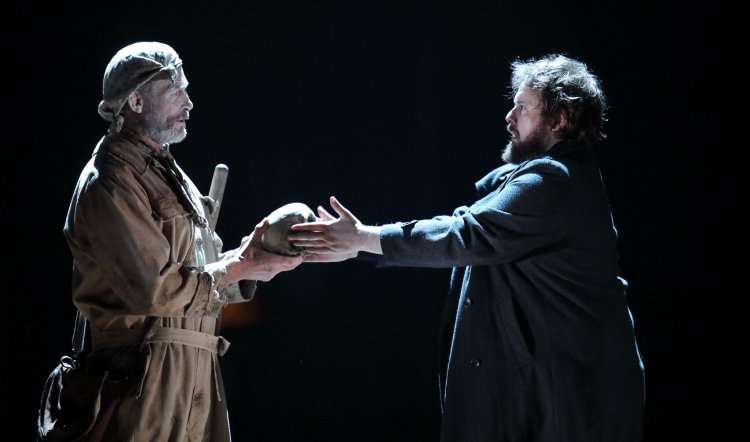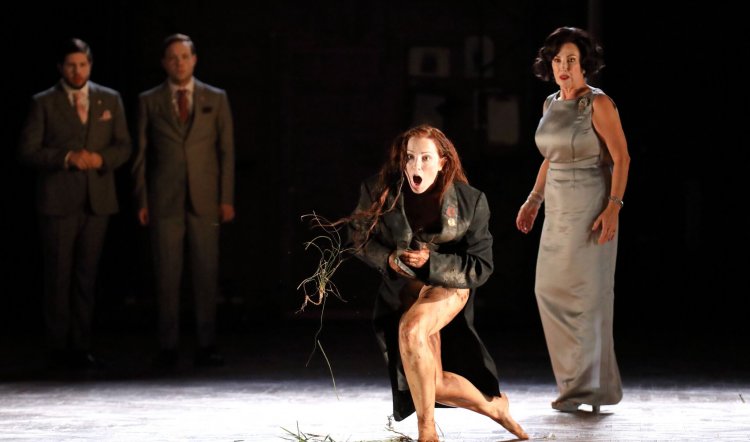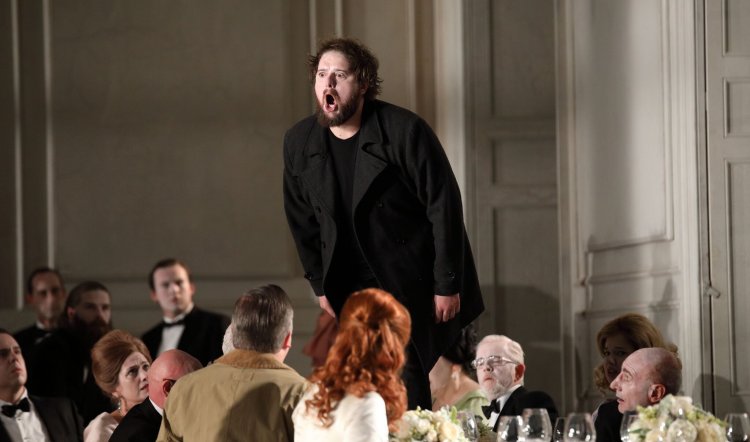
HAMLET - ADELAIDE FESTIVAL
HAMLET, Glyndebourne Festival Opera and Adelaide Festival at the Festival Theatre, 2, 4 and 6 March 2018. Photography by Tony Lewis, above - Jud Arthur and Allan Clayton, below - Lorina Gore and Cheryl Barker; below again - Allan Clayton and guests
A successful major new opera is rare enough, that it’s virtually homegrown is, frankly, a cause for celebration and pride. It also places the Adelaide Festival artistic team of Neil Armfield and Rachel Healy at the very top of that rarefied heap: they really are special. And the alignment of stars continues.
The world premiere of Australian composer Brett Dean’s Hamlet was a sensation at Glyndebourne last year and, as its director, Neil Armfield was reasonably certain of the inside track for its second production. It was a fortuitous conjunction. After the artistic and popular triumph of the Kosky/Handel Saul at the 2017 Adelaide Festival, achieving an equally compelling international yet locally-focused centrepiece would have been impossible if Hamlet had not already been in the wings. As it is, for a number of reasons this Hamlet surpasses expectation and importance and is in every sense a landmark event.
Dean and Canadian librettist Matthew Jocelyn begin in the way they mean to go on: grabbing Shakespeare’s fabled words in both hands and taking from as many versions as suit their vision. At an elegant gathering in Elsinore a fragmented “...be or not to be, or not to be...” electrifies and will recur throughout, as English tenor Allan Clayton wrestles with his demons and agonised rage at what happened to his beloved father.
Hamlet’s miserable plight is palpable in the presence of his mother Queen Gertrude (Cheryl Barker) and uncle, the usurping Claudius (American baritone Rod Gilfry) as they prowl and preen at the banquet. He is lightheaded with misery, the life of his mind is on the brink of collapse. It is soon matched by the unhappy bewilderment of his soulmate Ophelia (Lorina Gore) when he pushes her away and unwittingly adds to her own sense of displacement.

Remarkably, Shakespeare’s tragedy is both compressed and expanded in the opera. That’s because the music takes on much of the burden of character and narrative so the play and its characters are stripped bare and its inner workings are depicted by the orchestra (Adelaide Symphony Orchestra under its conductor Nicholas Carter).
The score is at once unsettling and playful, dreamlike and grounded. It is way beyond mere backdrop or support for the voices but neither does it overpower. It’s an astonishing achievement as the mid-size ensemble is augmented by percussion, electronics and out-of-pit placement of what present as FX, and a dynamic and disciplined onstage chorus (State Opera Chorus).
This Hamlet is a fast-moving three hours, plus a half hour interval and the set design and lighting are in on the action as the Enlightenment white walls and tall windows are pushed and pulled to different positions and effects by cast members. (Set design Ralph Myers, lighting Jon Clark.) It’s a reminder – as the bare timber struts and a rack of costumes are casually revealed and incorporated – that all the world’s a stage and this place even more so than usual (also underlined by Alice Babidge's almost-everyday costumes).
Theatricality and a lighter note are wittily to the fore in the counter-tenor characters of Rosencrantz (Rupert Enticknap, from the UK) and Guldenstern (the American Christopher Lowrey). They aren’t sent to England with Hamlet but rather, remain in Elsinore as observing, twittering participants to the unfolding disaster. They are a vocal and dramatic counterweight to Jud Arthur’s Ghost and further evidence of the thoughtful brilliance at work in the piece.

Further moral and emotional positioning are acted and sung with clarity by English tenor Kim Begley as a fine, sinister Polonius, while Sam Sakker’s supercilious Laertes is on the opposite end of the spectrum from Douglas McNicol’s Horatio. The famous set pieces are visually and dramatically satisfying, in particular, the “grave-digging” scene is a coup de theatre and Jud Arthur’s doubling as the Gravedigger is perfect.
Ophelia’s rejection and subsequent disintegration have rarely been as affecting as played and sung by Lorina Gore. Her initial athleticism and physical confidence add a dreadful #metoo element to what happens and the result is genuinely shocking – even though we know what’s coming.
This is also in part due to Cheryl Barker’s Gertrude. She is a woman who knows she’s a political parcel, passed around the royal court and as immaterial as any chattel. Her dignity and compassion towards Ophelia are a painful contrast to how she is treated and the two women excel in their portrayals, both vocally and histrionically.
Meanwhile, Neil Armfield’s direction maintains the forward momentum to the ultimate bloodbath without sacrificing humanity or emotion. This Hamlet is an unforgettable achievement with, in this premiere iteration, the remarkable Allan Clayton at its heart. Brett Dean is now a fully realised and extraordinary operatic composer and those lucky enough to be in Adelaide for any of the three performances know they’ve witnessed something very special.
Comments
Leave a Comment
Enter your username and password to comment. Don't have a username? Register now.




Be the first to leave a comment below